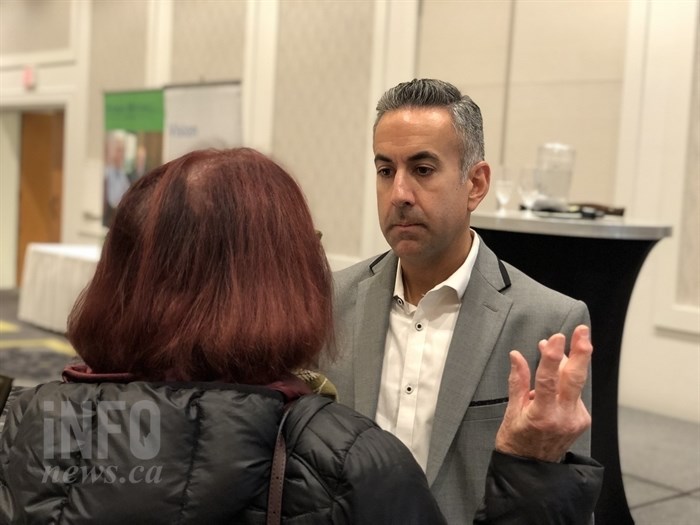
Kelowna mayor Colin Basran answered questions about housing, transit and quality of life at a Tuesday, Nov. 12, 2019, meeting.
(KATHY MICHAELS / iNFOnews.ca)
November 12, 2019 - 2:56 PM
In a conversation that covered everything from BC Transit’s seemingly abandoned tracking app to whether or not Kelowna will ever get out from under the so-called sunshine tax, one thing was clear — this city is a well-loved work in progress.
At the JCI Kelowna Mayor's Luncheon the consensus was there’s not enough attainable housing, public transit is not as far-reaching or efficient as everyone would like, wages are low and jobs aren't diverse. But, when all those issues are taken out of the mix, the quality of life is actually pretty great.
Mayor Colin Basran summed it up in his opening remarks when he said Kelowna has 20 wineries, 16 breweries, 14 golf courses, and is a well-loved destination for residents and tourists alike.
“We all know about the outdoor amenities that make this place great,” he said, later making reference to the “Okanagan lifestyle” that is not only a clothing slogan but a concept that resonates with many.
That said, the city has grown in leaps and bounds and as is the case with any growth spurt, there’s been some awkwardness.
Some of it has to do with turning around issues created by generations of urban sprawl. In the far-reaching, and at times more affordable, neighbourhoods of the city there will probably never be a viable transit link, Basran said, explaining that it makes no sense to send a bus into the hills for a few passengers.
In higher-density neighbourhoods, where the cost of renting is currently high and the housing supply is quite low, Basran and council have been implementing measures to bulk up. This would help both with reducing the reliance on car culture — 79 per cent of Kelowna residents commute by driving in single-occupancy vehicles — and increase housing options for all income levels.
“In most settings like this, a lot of the attention is on market housing,” he told the room of JCI members. “Of course, we need attainable market housing, and that’s going to be more of a challenge as we attract more people here.”
But in the meantime, he said, the city has created tax and grant incentives for developers to create purpose-built housing to some success.
From March 2016 to September 2018, 1,200 purpose-built rental units have gone up in Kelowna and to meet the population needs going forward, he said, there’s an expected need to build 300 every year to meet ongoing demand.
Some of what Basran said seemed to resonate with the crowd of young professionals, but for some current UBC Okanagan students, it seemed to be too little.
Romil Jain, UBC Okanagan student union president, said he moved to the Okanagan to study but it’s unlikely he’ll be able to stay.
“Personally I would love to stay in Kelowna — there’s a wonderful standard of living, but in my studies, there’s not much possible for work,” Jain said.
“The city’s ambitions are good, but UBC Okanagan’s plans are bigger and the city needs to step up to meet them.”
The city is projecting 50,000 new residents in the year to come but, Jain said, a good number of those people will be UBC Okanagan students and their needs should be factored in.
As is, renting is an onerous prospect for many students with a three-bedroom apartment close to the uni ranging in price from $2,700 to $3,000.
At that price, student union vice president Nimrah Pannu said it’s worth it to look at other cities, which have more job options in addition to a high cost of living.
Basran told the crowd earlier that the loss of jobs from industry leaders like Tolko was a cause for concern, but other than making the city an affordable place to do business there's not much it can do to address the phenomenon of fewer jobs and lower wages in the Okanagan. As is, he said, Kelowna has the most diversified economy it's ever had.
To contact a reporter for this story, email Kathy Michaels or call 250-718-0428 or email the editor. You can also submit photos, videos or news tips to the newsroom and be entered to win a monthly prize draw.
We welcome your comments and opinions on our stories but play nice. We won't censor or delete comments unless they contain off-topic statements or links, unnecessary vulgarity, false facts, spam or obviously fake profiles. If you have any concerns about what you see in comments, email the editor in the link above.
News from © iNFOnews, 2019